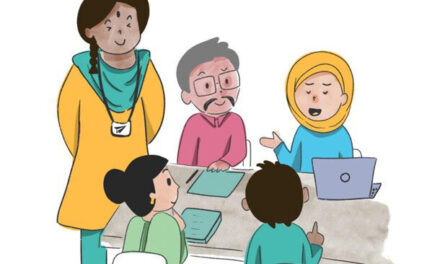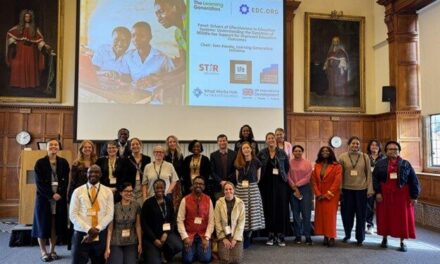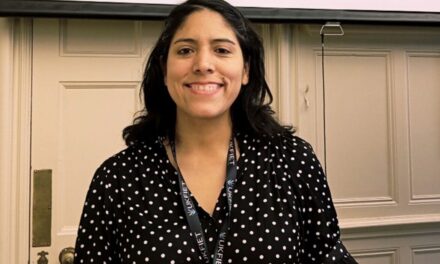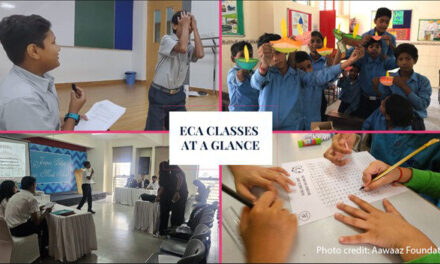This blog was written after the UKFIET September 2025 conference by the theme convenors of ‘Climate and environmental justice’, one of seven conference themes: Rachel Wilder, University of Bath, and Fernanda Gándara, Room to Read.
Along with other panellists, Rachel and Fernanda will be sharing some highlights from discussions in a 1-hour webinar on Wednesday 8 October – this is open to all, whether you were able to attend the conference or not. Register here to join.
If we had to pick just one idea that resonated – deeply and repeatedly – through the Climate and Environmental Justice sub-theme of the UKFIET 2025 conference, it was the Power of Conversation. Meeting someone’s eyes, feeling their conviction and curiosity in their posture and in the timbre of their voice, respectful exchanges on a topic of mutual interest: these are the moments where we build connections, take note of points of tension; this is where we experience humility and inspiration in our individual learning processes. Conversations also form the roots of rich collaborations that fuel movements for social and political change.
The Climate and Environmental Justice sessions were opulent in unlearning, witnessing and re-imagining what is possible in education. Our speakers considered what environmental and climate education can enable for children, teachers and communities, as well as how educational infrastructure and provision can be funded and re-designed for sites that experience the greatest burden of the climate crisis.
A key aspect of our ‘unlearning’ was to step back from the oft-asked question ‘what works?’ to ‘what matters and to whom?’. By adopting a justice lens, our speakers pushed each other and our audiences to focus on humanity, nature, relationships and communities. Rather than considering schools as buildings that children go to be educated, the idea of the ‘school’ dispersed across community spaces and learning materials. Rather than framing learning as simply acquiring knowledge, our panellists shared multiple examples of how ‘doing’ climate education opens our imagination about what is possible in the field of climate, environmental and ‘green’ education. Our speakers highlighted the contributions that marginalised people and the more-than human – young children, indigenous communities, teachers, natural and recycled materials – have made to reforming the content and models of education.
While our speakers and audiences recognised the need to preserve spaces for foundational learning, they also recognised that the reality of polycrisis – which links disparate geographies around the world – means we have a greater need than ever to facilitate learning about global-local-global relationships. Climate and environmental crises, violent conflicts, political upheaval and the rise of populist agendas: these all contribute to high levels of uncertainty, anxiety and fear. In the absence of safe spaces for conversation and connection, polycrises threaten to polarise and divide people, perpetuate further destruction, dismantle education systems that have taken decades to fund and refine, and loss of life.
Building communities of practice and enhancing the power of collaboration
The diversity of the Climate and Environmental Justice sessions was reflected in the methodologies, in the epistemologies, in the topics, in the identities and in the geographies of our presenters. The discussions were rich, but at times they could feel fragmented, in their scope, goals and impact. It became clear that as researchers and practitioners in the field of climate education, we need to create larger and more frequent spaces for sharing learnings and weaving solutions. The localised nature of climate projects, largely bounded by nature and resources, prevents some of their inspiring insights to make their way into global narratives, which tend to focus on what works at scale.
We believe that by creating a stronger community of practice, where we share, leverage and simultaneously keep the gaze on the micro and the macro, we can contribute to the sustainability of climate education while protecting the unique community-embedded yet globally-connected solutions that will transform peoples and places in just manners.
Our commitment is, therefore, to foster spaces that advance and protect the conversations that we need to continue having.
————————-
Where do we go from here? Join our October webinar to learn more and/or get involved
The UKFIET 2025 conference left us feeling fired up and inspired! At the end of each Climate and Environmental Justice session, people were still talking and thinking and this left us wondering how to harness this energy to put fuel behind some of our collective, preferred futures for justice in education. We also wanted to share more widely some of the highlights from our sessions. In this webinar, we will explore both.
This webinar will feature three speakers (a tiny snapshot of the incredible wealth of expertise across the programme!):
- Dr Frans Kruger, Assistant Professor, Education, University of Nottingham
- Ms Tooba Rauf, Doctoral researcher, UCL
- Jen Hobbs, independent consultant, Education and Fragility Expert
Please join us on Wednesday 8 October 2025, 15.00-16.00 (UK time).




